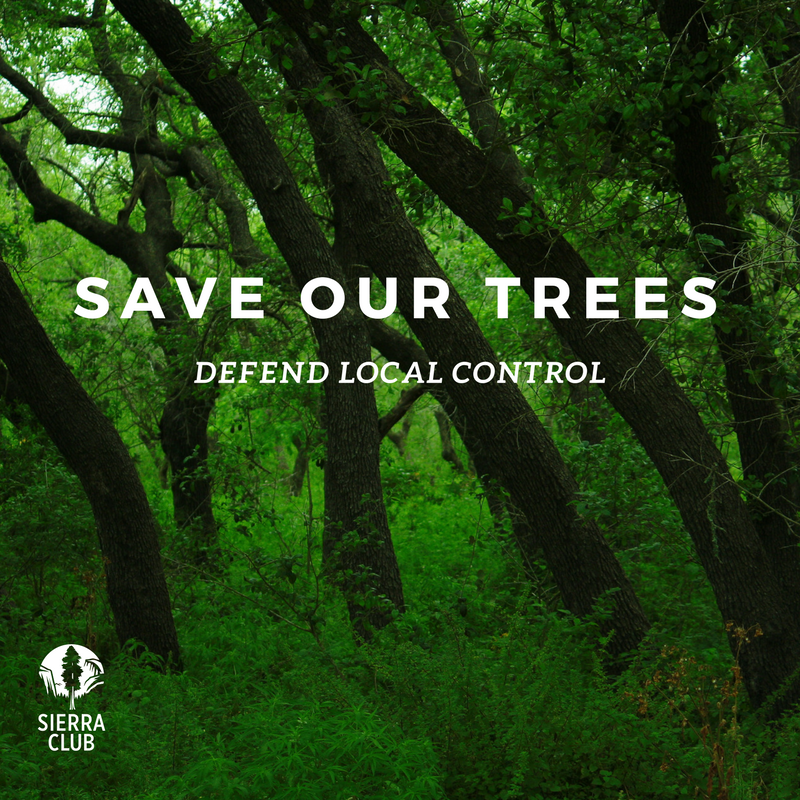By Cyrus Reed

When Governor Greg Abbott announced a special legislative session in June, the majority of the 20 agenda items were aimed at taking away local control from municipalities. From the beginning of the session, which kicked off on July 18, Sierra Club pushed back against proposals to speed up permitting, take away local regulations, dictate what bathroom people should use, determine how and when cities can raise local property taxes, and remove local protections for trees.
The results of the special session were mixed: While the Governor signed a slew of bills that chipped away at voting rights and reproductive rights, the House of Representatives managed to stop proposals on bathroom regulation, local permitting rules, property tax rules and tree ordinances.
We’ve spent the past couple of months organizing to defend local control of trees because tree ordinances serve both historical and environmental purposes. But things in the Legislature got confusing towards the end of the session. If you were left wondering what exactly happened with HB 7 and what exactly the bill Abbott ended up signing into law on Aug. 17 does, here’s a simplified overview of the complex journey that the tree bill embarked upon during this special session:
What’s the “Tree-Lite” Bill?
First things first: “Tree-lite” is a term we made up to convey that the tree bill that passed was unlike other pieces of previous legislation vigorously opposed by dozens of Texas cities, the Sierra Club, and all major conservation organizations that would have stripped the ability of cities to regulate and protect trees. The bill that ultimately passed was much more narrowly focused on how cities regulate mitigation fees if and when larger trees are removed.
The Tree Bill Gets Hijacked in the Senate
As it originally passed the House of Representatives during the special session, HB 7 by Rep. Dade Phelan was equivalent to a bill vetoed by Governor Abbott back in June during the regular legislative session. Abbott thought that bill, Senate Bill 744, was too weak on turning back tree ordinances and didn’t do enough to promote the interests of local property owners and developers.
After HB 7 passed the House overwhelmingly, it went to the Senate, where it was essentially hijacked by the more conservative Senators and the Governor’s office, adding language that would have prevented cities from protecting any tree less than 24 inches in diameter and from doing any regulations in their extra-territorial jurisdictions. Despite opposition from municipalities, the military, conservation organizations, and hundreds of tree protectors, the Senate passed the hijacked bill on a 17-14 vote.
Speaker Straus and Rep. Phelan Stand Up to the Governor
When the Senate version of HB 7 came over to the House, Speaker Joe Straus and Rep. Dade Phelan said they wouldn’t consider it, as the added Senate provisions fundamentally changed a mitigation fee bill into a tree regulation bill.
The Senate put forth a new bill took out the worst provisions and passed on a 17-14 vote, and was adopted by the House on the last day of the legislative session.
Sierra Club worked with Rep. Phelan and other offices to make sure that the bill wouldn’t prevent cities from regulating trees and would. Eventually, the bill passed overwhelmingly on a 119-23 vote. Many members, including many Democrats,voted for it due to the commitment from the Speaker not to allow a far worse bill from getting to the House floor, even if it does slightly lessen local control on tree mitigation fees.
So What Does HB 7 Actually Do?
HB 7 prevents cities from charging mitigation fees for a tree that is less than 10 inches in diameter on residential property, but it does not prevent cities from regulating those trees or requiring that property owners plant trees to replace them. Additionally, cities that do charge mitigation fees for removed trees must create a system that allows fees to be lowered or eliminated if the person agrees to plant trees equivalent to those removed.
While the bill does contain detailed requirements about the credits provided for tree planting depending on the size and type of property, it will still be up to the cities to determine the size and types of trees that would meet those provisions, along with where and how they would be planted, including in extra territorial jurisdictions.
Conclusion: Trees Are Good For Cities, So We Won't Stop Until The TX Lege Leaves Them Alone
To sum it up, HB 7 provides certain concessions to developers to get credit for planting trees but does not prevent cities from regulating trees. While Sierra Club doesn’t support the legislation, we and our many members helped make sure that far worse proposals didn’t go forward, ultimately preventing the worst from happening.
We’ve still got work to do in future sessions with our members, our cities, and our allies to make sure that legislation designed to do away with city control and allow the clear-cutting of trees goes nowhere.